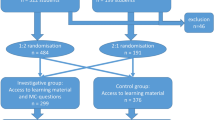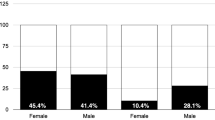Abstract
Objective
To evaluate the role of multiple choice questions (MCQs) administered at the conclusion of the lecture in improving medical student learning.
Methods
This prospective interventional study was conducted in a Medical College. In ten randomly chosen pediatric lectures delivered to prefinal year medical students, MCQs were administered at the conclusion of the lecture and the answers were discussed with the students. After the series of lectures, students were evaluated by hundred ‘single best response’ MCQs with half from the lectures with MCQs self-assessment (MSA group) and the rest were from the other set of lectures (WMSA group). Scores from both groups were compared using paired ‘t’ test.
Results
When the scores from MSA and WMSA groups were compared for the study population, no significant difference was noted. A significant difference (p = 0.003) was found between the groups, when the mean (± SD) scores of the men (25.2 ± 4.8 in the MSA group and 28.6 ± 7.3 in the WMSA group) were compared. No difference was seen among women, whose mean (± SD) scores in the MSA and the WMSA group were 26.6 ± 6.9 and 26.3 ± 6.9 respectively. When the scores of the first half of the session was analyzed, there was significant difference between the two groups among men (p = 0.0001) implying that lectures with MCQs self-assessment improved the long-term retention.
Conclusions
MCQs’ based self-assessment at the conclusion of the lecture does not improve the learning among prefinal year medical students. However, this study has shown the usefulness of MCQs based self-assessment among male medical students.
Similar content being viewed by others
References
Held S, McKimm J. Improve your lecturing. Br J Hosp Med. 2009;70:466–9.
Kacker SK, Adkoli BV. Need-based undergraduate medical curriculum. Indian J Pediatr. 1993;60:751–7.
Bonwell CC, Eison JA. Active learning: creating excitement in the classroom. Washington DC: George Washington University; 1991. p. 63.
Graffam B. Active learning in medical education: strategies for beginning implementation. Med Teach. 2007;29:38–42.
Palmer EJ, Devitt PG. Assessment of higher order cognitive skills in undergraduate education: modified essay or multiple choice questions? BMC Med Educ. 2007;7:49.
Diesel E, Alley M, Schreiber M, Borrego M. Improving student learning in large classes by incorporating active learning with a new design of teaching slides. Front Educ Conf. 2006;27:11–6.
Rawat MS, Kamal S. Education for primary pediatric care. Indian J Pediatr. 1997;64:369–72.
Gibbs G, Habeshaw S, Habeshaw T. Improving student learning during lectures. Med Teach. 1987;9:11–20.
Soudarssanane MB, Singh MC. Teaching epidemiology of acute diarrheal diseases to medical undergraduates—a new approach. Indian J Pediatr. 1994;61:277–80.
Verma K, Monte BD, Adkoli BV, Nayer U, Kacker SK. Inquiry-driven strategies for innovation in medical education: experiences in India. Indian J Pediatr. 1993;60:739–49.
Kramlinger T, Huberty T. Behaviorism versus humanism. Train and Dev J. 1990;44:41–5.
Rogers CR, Freiberg HJ. Freedom to learn. Columbus, Ohio: Merrill; 1994. p. 266.
Hart D. Opening assessment to our students. Soc Educ. 1999;65:343–5.
Abdel-Hameed AA, Al-Faris EA, Alorainy IA, Al-Rukban MO. The criteria and analysis of good multiple choice questions in a health professional setting. Saudi Med J. 2005;26:1505–10.
Downing SM. Reliability: on the reproducibility of assessment data. Med Educ. 2004;38:1006–12.
Considine J, Botti M, Thomas S. Design, format, validity and reliability of multiple choice questions for use in nursing research and education. Collegian. 2005;12:19–24.
DeMars CE. Gender differences in mathematics and science on a high school proficiency exam: the role of response format. Appl Meas Educ. 1998;11:279–99.
Ryan KE, Fan M. Examining gender DIF on a multiple-choice test of mathematics: a confirmatory approach. Educ Meas. 1996;15:15–20.
Cole N. The ETS gender study. How females and males perform in educational settings. ETS Technical Report 1997. Available from URL: http://www.edge.org/3rd_culture/debate05/debate05_index.html
Contributions
TSV designed the study, analyzed and critically evaluated the data and revised the manuscript and he will act as the guarantor of the paper. ABT collected the data, analyzed and interpreted the data and drafted the article. RM, VD, BK were involved in designing the study, collecting the data and drafting the manuscript.
Conflict of Interest
None.
Role of Funding Source
None.
Author information
Authors and Affiliations
Corresponding author
Rights and permissions
About this article
Cite this article
Serane, T.V., Arun Babu, T., Menon, R. et al. Improving Learning during Pediatric Lectures with Multiple Choice Questions. Indian J Pediatr 78, 983–986 (2011). https://doi.org/10.1007/s12098-010-0361-1
Received:
Accepted:
Published:
Issue Date:
DOI: https://doi.org/10.1007/s12098-010-0361-1




